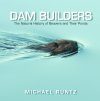Art / Photobook
Out of Print
By: Michael Runtz(Author)
306 pages, ~400 colour photos
![Dam Builders Dam Builders]()
Click to have a closer look
About this book
Contents
Biography
Related titles
About this book
Few animals in the world are as famous or as infamous as the beaver, and none save our species has the ability to so dramatically transform its environment. Beavers are remarkable animals. They have teeth that self-sharpen and never stop growing, and a heart that slows down and valves that close in their ears and noses when they dive. Their tail is the most multi-purpose of any animal on this planet; in addition to communication its many functions include serving as an air conditioner in summer and a food pantry in winter. From mighty moose that glean sodium from aquatic plants to swallows that live in drowned trees and tiny butterflies that nectar in meadows where a pond once stood, myriad organisms benefit from the actions of beavers.
Dam Builders is a comprehensive overview of the lives of beavers and the habitats that arise from their actions. It is a visual extravaganza: approximately 400 photographs provide intimate insights into the lives of beavers and the inhabitants of their ponds and related habitats. Many new observations and rarely seen moments – such as beavers fighting – are documented in it.
Contents
Acknowledgements
Preface
Introduction
Chapter 1. Of Fame And Infamy
Chapter 2. A Global Presence
Chapter 3. Tools Of The Trade
Chapter 4. Dam Builder
Chapter 5. Oasis Of Life
Chapter 6. The Living Dead
Chapter 7. The Big Freeze
Chapter 8. The Afterlife
Chapter 9. Subtle Signs And Clear-Cut Clues
Chapter 10. The Beaver Pond Gallery
Endnotes
Epilogue
Index
Customer Reviews
Biography
Michael Runtz has been an avid birdwatcher since the age of five and has worked as an interpretive naturalist in Algonquin Provincial and Point Pelee National parks, hosted an international television series Wild by Nature, authored 10 natural history books, and written more than 1,000 newspaper and magazine natural history articles. Michael teaches Natural History and Ornithology courses at Carleton University where his highly visual teaching style continues to attract record enrolments (to date more than 41,000 students have taken Natural History). Michael has received numerous awards including the Council of Canadian University Biology Chairs Distinguished Public Science Education Award and the Carleton University Lifetime Achievement Award. A popular keynote speaker and a regular guest on radio and television, Michael was the only Canadian featured in the TVO/NHK Japan 2001 Superteachers series that profiled such notables as Jane Goodall and Nelson Mandela.
Art / Photobook
Out of Print
By: Michael Runtz(Author)
306 pages, ~400 colour photos
"This weighty record showing 30 years of beaver watching is definitely worth the wait. I received my courtesy copy from the publisher Fitzhenry & Whiteside Ltd. last week, and have been engrossed ever since. Everything about this book is impressive: its stunning photographs, gripping account of little known beaver details, and its truly classy lay out, right down to the beaver silhouetted page number in the corner. (I had a good friend who was a copy editor at Random House and I know how much work pulling these details together can be.) I had prepared myself to be impressed, and was not disappointed. What I hadn't prepared for was to be surprised. After nearly 10 years in the beaver biz, reading and writing about them daily, and viewing them regularly at very close quarters, I pretty much thought I had heard and seen it all. Michael Runtz' book was still filled with gloriously unexpected treasures [...] "
– www.martinezbeavers.org
"With stunning photographs throughout, this extraordinary book may seem more suited for the coffee table than an academic bookshelf. But the photographs do more than simply illustrate the text – they tell the story of beavers visually and powerfully, bearing witness to engineering marvels that result in complex ecosystems that benefit both beavers and other species. The accompanying text, admittedly sparse relative to the photographs, is just as important and earns the book respect as an academic resource. Runtz (Carleton Univ., Canada) acknowledges that he is a naturalist, not a research biologist. But his bias as a naturalist who admires the beaver for its ecological role and skill for altering the landscape does not lessen the volume's value, which is a "blend of gleanings from [...] scientific literature" and Runtz's personal observations. The familiar tone of the prose draws readers into beavers' watery world. Dozens of other species – birds, reptiles, amphibians, invertebrates, mammals, flora – are considered as co-inhabitants of beaver constructed ecosystems, and the author examines beavers' impact on the human built world. Highly recommended"
– Choice Magazine

































